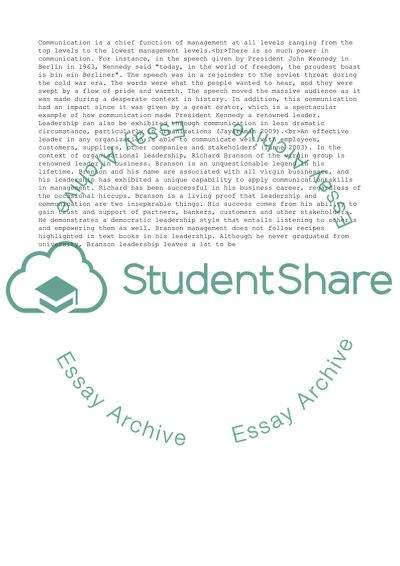Cite this document
(The worlds best managers and leaders are the worlds best Essay, n.d.)
The worlds best managers and leaders are the worlds best Essay. https://studentshare.org/human-resources/1798029-the-worlds-best-managers-and-leaders-are-the-worlds-best-communicators-is-this-true-use-examples-of-notable-business-or-political-leaders-to-substantiate-your-views-back-up-your-assessment-using-relevant-theory
The worlds best managers and leaders are the worlds best Essay. https://studentshare.org/human-resources/1798029-the-worlds-best-managers-and-leaders-are-the-worlds-best-communicators-is-this-true-use-examples-of-notable-business-or-political-leaders-to-substantiate-your-views-back-up-your-assessment-using-relevant-theory
(The Worlds Best Managers and Leaders Are the Worlds Best Essay)
The Worlds Best Managers and Leaders Are the Worlds Best Essay. https://studentshare.org/human-resources/1798029-the-worlds-best-managers-and-leaders-are-the-worlds-best-communicators-is-this-true-use-examples-of-notable-business-or-political-leaders-to-substantiate-your-views-back-up-your-assessment-using-relevant-theory.
The Worlds Best Managers and Leaders Are the Worlds Best Essay. https://studentshare.org/human-resources/1798029-the-worlds-best-managers-and-leaders-are-the-worlds-best-communicators-is-this-true-use-examples-of-notable-business-or-political-leaders-to-substantiate-your-views-back-up-your-assessment-using-relevant-theory.
“The Worlds Best Managers and Leaders Are the Worlds Best Essay”. https://studentshare.org/human-resources/1798029-the-worlds-best-managers-and-leaders-are-the-worlds-best-communicators-is-this-true-use-examples-of-notable-business-or-political-leaders-to-substantiate-your-views-back-up-your-assessment-using-relevant-theory.


